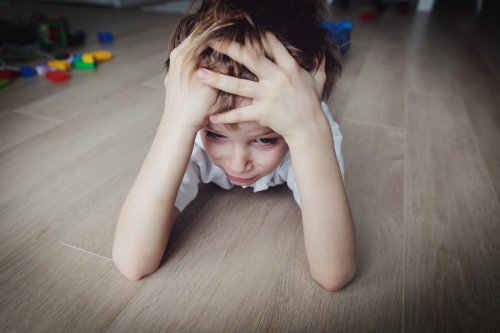8 Tips for Preventing Stress in Children


Written and verified by the psychologist María Alejandra Castro Arbeláez
In the face of the demands that modern society makes of children, it’s important to take measure to prevent stress in children. Schoolwork, life at home, and the pressure to adjust to society’s standards can all cause children to experience stress.
Therefore, parents must teach children to act assertively in the face of these situations. In fact, it’s one of the most important tasks that parents have before them.
“In the same way that perfect happiness is impossible, it’s also impossible to live without stress. The body finds itself in a process of constant adaptation to the demands in its environment, on the one hand, and those of its own development, on the other hand. In children, the process of maintaining consistency in their internal environment demands an incredible ability to change.”
– José Luis González de Rivera –
If you notice sudden mood or behavioral changes, your little one may require special attention. Irritability, anxiety and even unexplained physical symptoms are all indications of stress.
This condition also manifests itself through sleep loss, lack of appetite and lack of motivation. In light of any of these signs, as a means of prevention, you should put the following strategies into practice.
What can be done to prevent stress in children?
1. Slow down and reduce pressure in your daily routine
Children who are always in a rush never have time to be at peace. Before taking them to school in the morning, make a point to give them the time they need to get ready calmly.
Starting the day with shouting, nagging and forgetfulness isn’t the path to having a relaxed day. Making sure everything is ready for the next day the night before will help make mornings go much smoother.
2. Dialogue with your children whenever you have the chance
It’s important to know if there’s something in your children’s lives that’s weighing them down. Ask them if everything is going well at school and rule out the possibility that they’re the victims of bullying. Be attentive to any red flags.
Of course, you can’t solve every problem for your children, nor should you try. But you can guide them and help them react in an appropriate way.
3. Limit their participation in extracurricular activities
There’s a growing tendency among parents to sign their children up for a variety of art and sporting activities. And though cultivating interests and talents is fundamental, so is giving them time to be children.
Do what you can to keep the number of responsibilities and commitments they have from becoming overwhelming and harmful.
4. Be a model of assertive behavior
As we’ve said many times, the best way to educate children is through your own example. If you want your children to learn to react in a healthy way to situations that put them to the test, the best thing is to do the same yourself.
Take advantage of difficulties in order to give your children a more open and optimistic perspective regarding their problems.
Other recommendations regarding stress in children
5. Teach them a healthy sleep routine
Children who get enough sleep and rest well are less prone to suffer from stress. Furthermore, they’re better prepared to process the information that they encounter at school.
6. Limit children’s use of technology
Children who spend hours in front of a screen have higher chances of suffering from stress. Invite them to do things outdoors and spend some time away from the TV, tablet, cell phone, etc. There’s nothing more relaxing for little ones than spending quality time with their families.
7. Teach breathing techniques
It’s never too soon for children to get involved in yoga or mindfulness, especially as a way to prevent stress. These activities help little ones achieve a calm state. You can start with something as simple as teaching them to do some deep breathing in order to balance their emotions.

8. Do some sort of physical activity with your children
Stress causes our muscles to tense up, and that’s not something that only happens to adults. Children also need to channel their energy in a healthy way that puts their bodies and minds in harmony.
Even just taking a walk outdoors, going for a ride on your bikes or playing some ball can help reduce stress in children.
Identifying abrupt behavioral changes in your children is very important. If your child’s conduct strays from his or her usual way of behaving, don’t hesitate to seek professional help. School counselors and psychologists can help and support your family in the process.
In the face of the demands that modern society makes of children, it’s important to take measure to prevent stress in children. Schoolwork, life at home, and the pressure to adjust to society’s standards can all cause children to experience stress.
Therefore, parents must teach children to act assertively in the face of these situations. In fact, it’s one of the most important tasks that parents have before them.
“In the same way that perfect happiness is impossible, it’s also impossible to live without stress. The body finds itself in a process of constant adaptation to the demands in its environment, on the one hand, and those of its own development, on the other hand. In children, the process of maintaining consistency in their internal environment demands an incredible ability to change.”
– José Luis González de Rivera –
If you notice sudden mood or behavioral changes, your little one may require special attention. Irritability, anxiety and even unexplained physical symptoms are all indications of stress.
This condition also manifests itself through sleep loss, lack of appetite and lack of motivation. In light of any of these signs, as a means of prevention, you should put the following strategies into practice.
What can be done to prevent stress in children?
1. Slow down and reduce pressure in your daily routine
Children who are always in a rush never have time to be at peace. Before taking them to school in the morning, make a point to give them the time they need to get ready calmly.
Starting the day with shouting, nagging and forgetfulness isn’t the path to having a relaxed day. Making sure everything is ready for the next day the night before will help make mornings go much smoother.
2. Dialogue with your children whenever you have the chance
It’s important to know if there’s something in your children’s lives that’s weighing them down. Ask them if everything is going well at school and rule out the possibility that they’re the victims of bullying. Be attentive to any red flags.
Of course, you can’t solve every problem for your children, nor should you try. But you can guide them and help them react in an appropriate way.
3. Limit their participation in extracurricular activities
There’s a growing tendency among parents to sign their children up for a variety of art and sporting activities. And though cultivating interests and talents is fundamental, so is giving them time to be children.
Do what you can to keep the number of responsibilities and commitments they have from becoming overwhelming and harmful.
4. Be a model of assertive behavior
As we’ve said many times, the best way to educate children is through your own example. If you want your children to learn to react in a healthy way to situations that put them to the test, the best thing is to do the same yourself.
Take advantage of difficulties in order to give your children a more open and optimistic perspective regarding their problems.
Other recommendations regarding stress in children
5. Teach them a healthy sleep routine
Children who get enough sleep and rest well are less prone to suffer from stress. Furthermore, they’re better prepared to process the information that they encounter at school.
6. Limit children’s use of technology
Children who spend hours in front of a screen have higher chances of suffering from stress. Invite them to do things outdoors and spend some time away from the TV, tablet, cell phone, etc. There’s nothing more relaxing for little ones than spending quality time with their families.
7. Teach breathing techniques
It’s never too soon for children to get involved in yoga or mindfulness, especially as a way to prevent stress. These activities help little ones achieve a calm state. You can start with something as simple as teaching them to do some deep breathing in order to balance their emotions.

8. Do some sort of physical activity with your children
Stress causes our muscles to tense up, and that’s not something that only happens to adults. Children also need to channel their energy in a healthy way that puts their bodies and minds in harmony.
Even just taking a walk outdoors, going for a ride on your bikes or playing some ball can help reduce stress in children.
Identifying abrupt behavioral changes in your children is very important. If your child’s conduct strays from his or her usual way of behaving, don’t hesitate to seek professional help. School counselors and psychologists can help and support your family in the process.
All cited sources were thoroughly reviewed by our team to ensure their quality, reliability, currency, and validity. The bibliography of this article was considered reliable and of academic or scientific accuracy.
- Gorsuch, R.L.; KEY, M.K. (1974). Abnormalities of pregnancy as a function of anxiety and life stress. Psychosom. Med. 36: 352-372.
- Corraliza, J. A. y Collazo, S. (2011).“La naturaleza cercana como moderadora del estrés infantil”, Psicothema,Vol. 23, no 2, págs. 221-226.
- Orlandini A. (1999). El estrés, qué es y cómo evitarlo.México: FCE.
- Pérez, V. M. O. (1912). El estrés en la infancia: estudio de una muestra de escolares de la zona sur de Madrid capital. Revista Iberoamericana de Educación, (59/2). http://revistarayuela.ednica.org.mx/sites/default/files/5305Mnez-Otero.pdf
- Trianes, M. V. (2002). Estrés en la infancia. Madrid: Narcea.
- Trianes Torres, M. V., Mena, M. J. B., Fernández-Baena, F. J., Escobar Espejo, M., & Maldonado Montero, E. F. (2012). Evaluación y tratamiento del estrés cotidiano en la infancia. Papeles del psicólogo, 33(1).
- Vega Valero, C. Z., González Betanzos, F., Anguiano Serrano, S., Nava Quiroz, C., & Soria Trujano, R. (2009). Habilidades sociales y estrés infantil. Journal of Behavior, Health & Social Issues, 1(1).
This text is provided for informational purposes only and does not replace consultation with a professional. If in doubt, consult your specialist.








